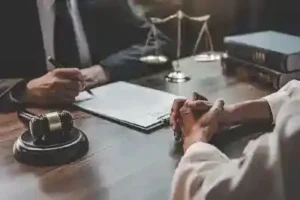As a Nashville car wreck attorney, I am full aware that Nashville welcomes over 500,000 daily commuters and 14 million tourists each year, which makes our city prone to vehicle accidents. My experience as a Nashville car wreck attorney has shown me the impact of Middle Tennessee’s 71,000 serious crashes that leave victims facing devastating challenges every year.
Car accident victims often struggle with massive financial burdens and qualify for both economic and non-economic damages. Tennessee’s one-year statute of limitations requires victims to act quickly. My years of handling car wreck cases have revealed critical mistakes that cost victims thousands in potential compensation. This piece outlines these common pitfalls and shows you clear steps to protect your rights after an accident.

Common Mistakes Right After a Car Wreck
Your potential claim’s strength often depends on what you do right after a car wreck. My experience as a Nashville car wreck attorney has shown me three mistakes that can reduce the value of accident claims.
Not calling emergency services
Many drivers think they don’t need police for minor accidents. Notwithstanding that, calling 911 is essential whatever the accident’s apparent severity. Police officers serve several key purposes by:
- Investigating the crash scene
- Taking photographs of damage
- Interviewing witnesses
- Creating an official accident report
- Determining potential liability
Police reports act as unbiased documentation that stops drivers from making false claims later. Not reporting certain accidents can lead to serious problems, including license suspension and misdemeanor charges.
Moving vehicles unnecessarily
The urge to clear traffic might be strong, but moving vehicles too quickly can destroy vital evidence. You should only move your vehicle when:
- No one is seriously hurt
- Your vehicles block active traffic
- You can do it safely without causing more damage
In stark comparison to this, keep your vehicle where it is if:
- Someone has serious injuries
- Your vehicle has major damage
- You’re not sure who’s at fault
- There are hazardous materials involved
Take pictures of the original positions before moving any vehicle if it’s safe. Then turn on your hazard lights and use safety items like road flares or triangles to warn other drivers.

Failing to document the scene
Good documentation right after a wreck makes your claim stronger by a lot. My experience with many car wreck cases in Nashville shows that a full picture should include:
- Photographs of:
- Vehicle damage from multiple angles
- The accident scene with skid marks
- Weather and road conditions
- Traffic signs and signals
- All vehicles’ license plates
- Information from other parties:
- Names and contact details
- Driver’s license numbers
- Insurance policy information
- Vehicle registration details
Getting contact information from witnesses at the scene is a great way to get support. Their statements help establish fault or counter disputed claims. You should also write down responding officers’ badge numbers and names.
Evidence can vanish quickly after an accident and memories fade fast. Start a detailed journal to track your memories of events, symptoms, and accident-related expenses. This record will help your car wreck attorney build a strong case to get you compensation.

Critical Documentation Errors
Good documentation is the life-blood of a successful car accident claim. My years as a Nashville car wreck attorney have shown me how documentation errors can reduce compensation by thousands of dollars.
Missing medical records
Medical records are vital evidence that link your injuries to the accident. Of course, insurance companies inspect these documents carefully during claim evaluation. Missing or incomplete medical records can:
- Create gaps in proving injury causation
- Make it hard to establish the full extent of damages
- Give insurance companies reasons to deny or reduce claims
Your medical documentation should have these items to protect your claim value:
- Emergency room records
- Diagnostic imaging results
- Treatment plans
- Prescription records
- Follow-up visit notes
Some injuries don’t show symptoms right after an accident. This makes consistent medical documentation significant as new symptoms appear. Insurance adjusters often say delayed symptoms aren’t related to the crash, especially when you have gaps in medical records.
Incomplete accident reports
A detailed accident report is the foundation of your claim. Small errors or missing information in police reports can lead to serious problems:
- Higher insurance premiums – sometimes up to USD 1,000 more annually
- Wrong assignment of fault
- Lower injury compensation
- Problems in legal proceedings
These mistakes show up often in accident reports:
- Wrong vehicle details
- Missing witness information
- Wrong sequence of events
- Incomplete road condition documentation
Police departments let you fix report errors within 30 days of the whole ordeal. You should check your accident report quickly for accuracy. Look carefully at:
- Personal information accuracy
- Description of the accident
- Citations issued
- Witness contact details
Without doubt, solid documentation makes your position stronger during settlement talks. Insurance companies depend heavily on these records to check if claims are valid. Poor or missing documentation often leads to:
- Slower claim processing
- Lower settlement offers
- Higher chances of claim denial
- Problems proving fault
As an experienced car wreck attorney in Nashville, I see how good documentation affects compensation amounts directly. Insurance adjusters look at every detail, so you need complete records from the moment of impact through your entire recovery.

Insurance Company Communication Mistakes
Insurance companies use tactics to pay less after car accidents. I’ve seen many cases as a Nashville car wreck attorney where victims hurt their claims by talking too much with insurance companies.
Giving recorded statements too soon
Insurance adjusters are quick to ask for recorded statements right after accidents. They make it sound routine, but these recordings have specific goals:
- Lock in your version of events early
- Find holes in your story
- Look for ways to deny your claim
- Judge how you come across
Adjusters might tell you recorded statements are required. The truth is no law requires you to give one to another driver’s insurance company. You have better options:
- Ask them to put everything in writing
- Say no thanks until you talk to a lawyer
- Let your lawyer handle all communication
Accepting early settlement offers
Insurance companies love to make quick settlement offers. They hope you’ll take the money before you know how badly you’re hurt. These quick offers usually:
- Come before doctors finish checking you out
- Don’t cover all your treatment costs
- Leave out future medical bills
- Short-change your pain and suffering
The moment you say yes to a settlement, you can’t ask for more money later, even if:
- Your injuries get worse
- You discover new injuries
- You need more treatment
- Medical bills pile up higher than expected
Insurance adjusters want to settle claims fast and cheap, and their offers are nowhere near what your claim is worth. Smart moves include:
- Waiting until you’re fully recovered
- Getting clear diagnoses from doctors
- Adding up all accident costs
- Learning what your claim is really worth

Not reading insurance documents carefully
Your insurance policy’s fine print has vital information about what’s covered and what’s not. These documents are the foundations of your claim because:
- They’re binding contracts between you and the insurer
- Each company’s coverage is different
- Some situations aren’t covered
- Policy details decide claim outcomes
You need to review these parts carefully:
- Coverage limits and deductibles
- What’s not covered and why
- How to file claims
- Rules about cancelation
- Medical coverage details
Insurance companies might twist policy limits or provisions during claims. A full review of documents helps you:
- Know your rights
- Find all available benefits
- Spot coverage limits
- Guard against claim denials
My years as a Nashville car wreck attorney show that smart insurance communication gets better results. Adjusters look at every detail, so you must handle all talks with care and know your rights.
Social Media and Legal Mistakes
Your social media activity after a car accident can affect your claim value by a lot. I’ve seen countless cases where victims hurt their claims through online posts as a Nashville car wreck attorney.
Posting about the accident online
Insurance companies actively monitor social media accounts to find evidence against claims. Even harmless-looking posts can create big problems:
- Photo Evidence Issues:
- Check-ins at locations suggesting physical activity
- Pictures showing you engaging in daily activities
- Group photos at social events
- Videos contradicting injury claims
- Legal Documentation Risks:
- Posts become part of legal records
- Courts may grant access to private accounts
- Even deleted content remains discoverable
- Messages and comments can be subpoenaed
Insurance investigators inspect social media profiles to find gaps between claimed injuries and online activities. A simple status update about feeling “better” or photos from family events might make your injuries look less serious.
Here are vital points about social media use after an accident:
- Privacy settings don’t protect you much
- Insurance companies hire specialized investigators
- Your friends’ and family’s posts can affect your claim
- Location tags leave evidence trails
- Comments on others’ posts stay visible
Discussing fault with others
Talking about accident fault online or in person puts your claim at risk. Insurance companies and defense attorneys look at every statement closely. People often make these mistakes:
- Immediate Reactions:
- Apologizing for the ordeal
- Expressing regret about circumstances
- Making statements like “I did not see you”
- Talking about accident details casually
- Communication Pitfalls:
- Responding to insurance company friend requests
- Accepting connections from unknown profiles
- Getting into accident-related discussions
- Sharing opinions about fault determination
Here’s how to protect your rights after an accident:
- Social Media Precautions:
- Set profiles to private
- Decline new connection requests
- Don’t post accident-related content
- Ask friends not to tag you
- Stay away from location check-ins
- Communication Guidelines:
- Direct all questions to your attorney
- Keep written records of conversations
- Don’t discuss case details
- Decline recorded statements
- Document all communication attempts
Note that insurance adjusters watch social platforms to find evidence that could lower settlements. They might see innocent posts as proof that your injuries aren’t as bad as claimed. Court orders or discovery processes can turn even private messages into evidence.
My experience as a Nashville car wreck attorney shows how smart social media management affects compensation amounts. Insurance companies look at every detail, so you need to be careful with all online activities until your case ends.
How to Protect Your Rights
You need to act fast and pay attention to details to protect your legal rights after a car wreck. Let me outline everything you need to do as your Nashville car wreck attorney to protect your interests.
Getting proper medical care
Quick medical attention serves two vital purposes. It will make sure you’re healthy and safe. It also creates vital documentation for your claim. Here’s what you need to know:
- Medical Documentation Requirements:
- Attend all follow-up appointments
- Complete recommended diagnostic tests
- Fill prescribed medications
- Perform suggested rehabilitation exercises
- Keep records of specialist referrals
Your medical records show a clear link between the accident and your injuries. Insurance companies can question your injury severity or claim they came from something else if you wait to get treatment.
Keeping organized records
Detailed documentation gives you a stronger case to get fair compensation. You should create separate files for:
- Medical Information:
- Treatment records
- Diagnostic results
- Prescription receipts
- Healthcare provider notes
- Rehabilitation plans
- Financial Records:
- Medical bills
- Lost wage documentation
- Property damage estimates
- Out-of-pocket expenses
- Insurance correspondence
You should also keep a daily journal about your pain levels, physical limitations, and how injuries affect your daily life. This record gives great insight into your recovery progress.
Working with an experienced attorney
Your chances of getting fair compensation improve when you get legal help early. A skilled car wreck attorney helps you in several ways:
- Case Evaluation:
- Assesses injury impact
- Calculates economic damages
- Determines non-economic losses
- Reviews insurance coverage
- Identifies liable parties
- Professional Support:
- Handles insurance negotiations
- Manages legal deadlines
- Collects essential evidence
- Coordinates with medical experts
- Protects your legal interests
A seasoned attorney knows insurance company tactics and how to fight them effectively. They make sure you get compensation that covers both your current and future needs.
Car wreck attorneys work on contingency fees, which means you only pay if they win your case. This makes quality legal help available without adding financial stress during your recovery.
Note that insurance companies have teams of adjusters and lawyers who want to minimize payouts. Professional legal guidance levels the playing field and protects your rights throughout the claims process.
Conclusion
Car accidents create overwhelming challenges for victims. Many people reduce their potential compensation by making avoidable mistakes. My experience with Nashville car wreck cases shows these mistakes can cost victims thousands of dollars in compensation:
- Immediate Post-Accident Mistakes
- Not calling emergency services
- Moving vehicles before taking photos
- Not collecting vital evidence
- Documentation Oversights
- Incomplete medical records
- Mistakes in accident reports
- Missing witness statements
- Insurance Company Missteps
- Giving recorded statements too early
- Taking first settlement offers
- Not understanding policy documents
Legal guidance helps victims avoid these mistakes that can get pricey and maximize their compensation. Victims have the best chance to receive fair compensation for injuries and damages through detailed documentation, smart communication, and professional representation.
Note that Tennessee’s law limits the time to file accident claims. Quick action protects your rights and builds a stronger case for fair compensation. My team can help guide you through the claims process and protect your interests during your recovery.
FAQs
Q1. When should I consider hiring a car accident attorney? You should consider hiring an attorney if you’ve suffered serious injuries, if fault is disputed, if you’re dealing with complex insurance issues, or if you feel overwhelmed by the claims process. An experienced lawyer can help maximize your compensation and protect your rights.
Q2. What are some common mistakes to avoid after a car accident? Common mistakes include not calling emergency services, moving vehicles unnecessarily, failing to document the scene, giving recorded statements too soon to insurance companies, and posting about the accident on social media. These errors can potentially reduce your compensation.
Q3. How can I protect my rights after a car accident? To protect your rights, seek prompt medical attention, keep organized records of all accident-related expenses and treatments, avoid discussing fault with others, be cautious about what you share on social media, and consider consulting with an experienced car accident attorney.
Q4. What kind of compensation can I expect from a car accident claim? Compensation can vary widely depending on the specifics of your case. It may include coverage for medical expenses, lost wages, property damage, and pain and suffering. The severity of injuries, impact on your life, and available insurance coverage all factor into potential compensation amounts.
Q5. How long do I have to file a car accident claim in Tennessee? In Tennessee, you generally have one year from the date of the accident to file a personal injury lawsuit. This is known as the statute of limitations. It’s crucial to act promptly to preserve your right to seek compensation, as failing to file within this timeframe can result in losing your right to pursue a claim.
Is there a Car Wreck Attorney Near Me?
Absolutely, in fact, there is a very competent and nationally known car wreck attorney near you – Timothy L. Miles. So contact Nashville car wreck attorney Timothy L. Miles for a free case evaluation if you were Injured in a car wreck in Nashville. The call is free and so is the fee unless we win or settle you case so call today and see what a Nashville car wreck attorney can do for you. 855-846-6529 or [email protected] (24/7/365). It will be the only call you need to make.
Law Offices of Timothy L. Miles
Tapestry at Brentwood Town Center
300 Centerview Dr. #247
Mailbox #1091
Brentwood,TN 37027
Phone: (855) Tim-MLaw (855-846-6529)
Email: [email protected]
Website: www.classactionlawyertn.com


